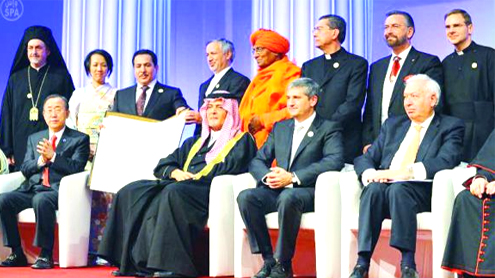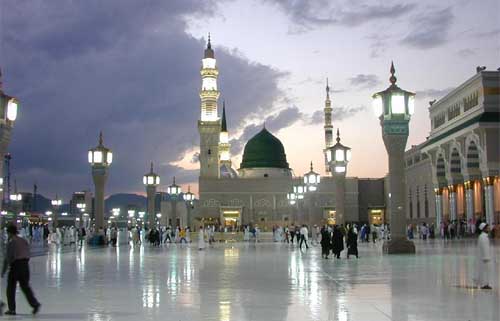
Custodian of the Two Holy Mosques King Abdullah’s call for interfaith dialogue is a great humanitarian initiative for the peaceful coexistence of the followers of different religions and cultures, said Foreign Minister Prince Saud Al-Faisal.
Speaking at the opening ceremony of the King Abdullah Bin Abdulaziz International Center for Interreligious and Intercultural Dialogue (KAICIID) here Monday night, Prince Saud said Vienna was selected to host the center considering its contributions to human civilization.“It is the most suitable place for a center whose goal is to bring peoples and cultures closer and deepen the values of moderation and tolerance,” said Prince Saud. He said King Abdullah’s interfaith dialogue initiative had its origin in Makkah.
“This center which we open today is the fruit of great endeavors that began in Makkah, and continued in Madrid and New York.
This opening means we have crossed the phase of preparation to start actual working to achieve the center’s objectives,” the prince said.Prince Saud described KAICIID as a historic initiative by King Abdullah. “We hope it would encourage objective and responsible human dialogue to strengthen the common grounds of the followers of different faiths that represent the core of divine messages and human cultures.”He said the center would take up important issues that concern all human beings and that were the reasons behind costly wars, bloody conflicts and loathsome crimes.
Prince Saud said lack of moral values was creating a lot of social problems around the world, including dismemberment of family relations, spread of injustice and corruption and increasing number of crimes.“We hope that this center would work for promoting understanding among the followers of different faiths as well as for reviving moral and human values,” he added.Prince Saud urged the center to work for deepening the values of tolerance, understanding and respecting the other and prevent abuse of religions and Prophets. He thanked all those who supported the dialogue center project.
Austrian President Heinz Fischer emphasized the importance of dialogue to settle conflicts and end violence. “People should think of options other than violence,” he said while emphasizing Austria’s multireligious and multicultural tradition. “This has made our country a center for dialogue,” he pointed out.In his address to the ceremony, King Juan Carlos of Spain commended the establishment of the center, saying it was the result of the first dialogue conference in Madrid. He praised King Abdullah for the initiative while pledging his country’s continuous support to the center.
UN Secretary-General Ban Ki-moon said his organization would extend all support for the successful functioning of the center. He praised King Abdullah and the governments of Spain and Austria for their efforts to set up the center.Muslim World League Secretary-General Dr. Abdullah Al-Turki said the center was established in response to the desire of the leaders of different faiths to cooperate for the welfare of humanity. “The world is in need of cooperation for the good,” he added.Speaking to reporters after attending the center’s opening ceremony, Prince Saud said: “This is a historic day. We hope the center would contribute to bringing people closer and settle their disputes peacefully.”
The opening ceremony was attended by Austrian Foreign Minister Michael Spindelegger, Spanish Foreign Minister José Manuel García-Margallo and hundreds of religious leaders.Prince Saud said he hoped the center would “bring peace and understanding between the various religions. Religion has been the basis for many conflicts.”The center, launched by Saudi Arabia as an international organization with multifaith oversight, aims to help religions contribute to solving problems such as conflicts, prejudice and health crises rather than be misused to worsen them.“The prime purpose is to empower the active work of those in the field, whether in the field of dialogue, of social activism or of conflict resolution,” said Jerusalem-based Rabbi David Rosen, representing Judaism on the nine-seat board of directors.
“We want to empower you,” he told an opening session where dialogue projects from Europe, the Middle East and Africa reported on how they worked to foster inter-faith understanding.The center plans to work first on improving how religions are presented in media and schoolbooks, involving faith leaders in children’s health campaigns in poor countries and hosting religious leaders for fellowships at its Vienna headquarters.
Saudi officials at the Vienna conference stressed the dialogue message was being spread back home as well.“The aim is to promote acceptance of other cultures, moderation and tolerance,” said Fahad Sultan Al-Sultan, deputy head of a Saudi national dialogue effort launched in 2003.
“There are problems but we have achieved some success.”Board member Reverend Toby Howarth said its international status sponsored by Austria, Saudi Arabia and Spain gave the center several advantages over non-governmental organizations or church groups working on similar issues.It would have more “pulling power” dealing with government ministers on issues such as improving the way religions are presented in a country’s schoolbooks, said Howarth, who is interfaith adviser to the Archbishop of Canterbury.
Jehan Begum of the International Center for Research, Interfaith Relations and Reconciliation in Hyderabad said “This initiative is very important. King Abdullah has taken up this significant step and what makes this all the more valuable is that it is coming from a Muslim country and Muslim people are taking this initiative. We need people from Muslim countries to take such steps toward furthering the understanding between religions.”
One Austrian university student attending the event said: “This center will give me the chance to further my knowledge of other religions. There are many interesting open discussions taking place here which I have found to be enlightening. When the center opens, I plan to visit it and participate in its activities.”The fact that King Abdullah is the custodian of Islam’s two holiest mosques in Makkah and Madinah would “have weight in some Muslim countries”, he added.Spindelegger defended the establishment of KAICIID in Vienna saying “it is my deep conviction that there is no alternative to this dialogue”. KAICIID officials say the center is independent and would not be promoting any one religion. – Arabnews












